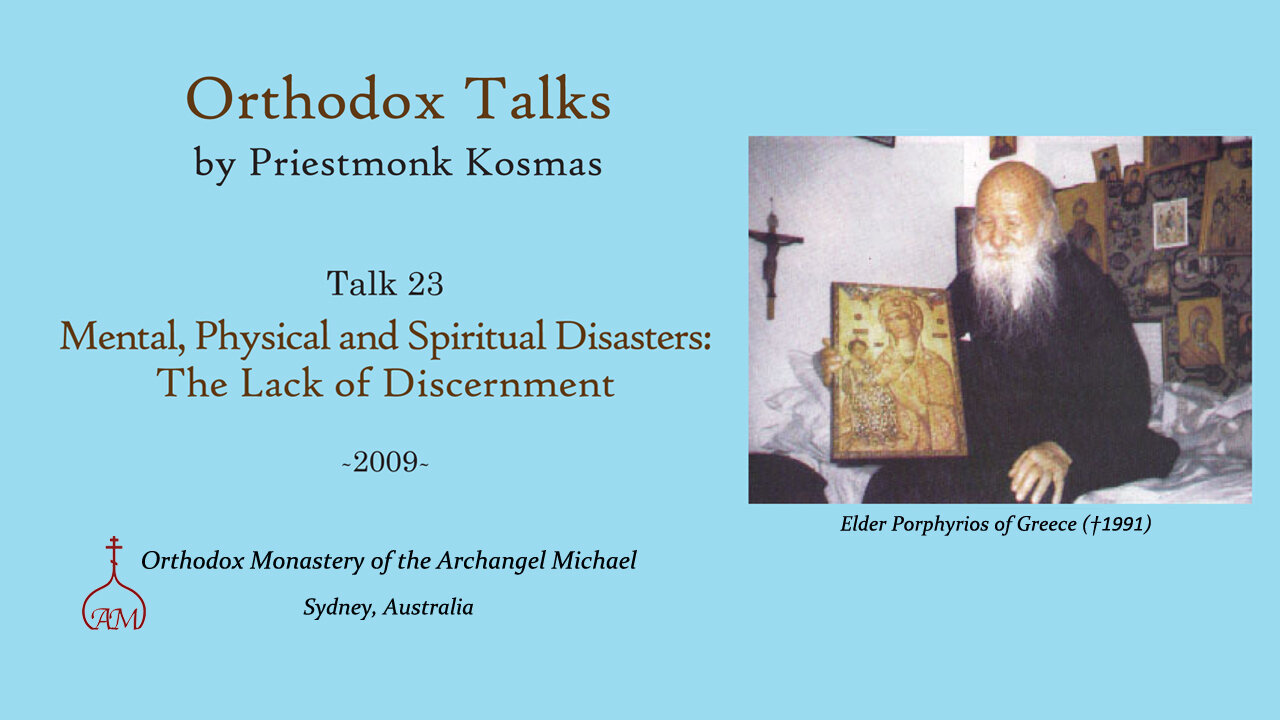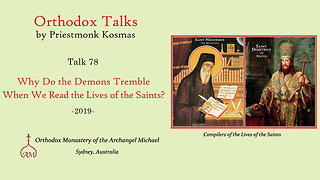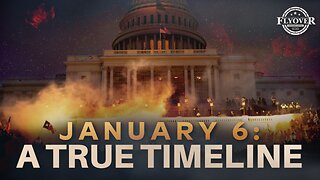Premium Only Content

Talk 23: Mental, Physical and Spiritual Disasters: The Lack of Discernment
Orthodox Talks by Priestmonk Kosmas, Sydney, Australia
Subscribe to the Orthodox Talks podcast: https://media.rss.com/orthodoxtalks/feed.xml
There is a mistaken view that the spiritual life concerns only spiritual matters, and that physical and mental issues are of little or no importance. However, diet, exercise, recreation, relationships, and managing stress and anxiety are not only part of the spiritual life, but a very important aspect of it. Though many do not realize it, the Church teaches that disregarding or abusing our bodies and minds is sinful and contrary to the teachings of the Church.
In this talk, Father Kosmas discusses this very relevant topic, drawing on the counsels of Elder Porphyrios of Greece (†1991). He emphasises that Elder Porphyrios was very understanding and lenient towards those who came to him because he understood the physical, mental, and spiritual weaknesses of Christians in these modern times. Listening to the elder’s discerning advice can help one avoid disasters that can even lead to the loss of one’s soul.
The following questions are also discussed: what is the difference between regret and repentance? Should parents have the boldness to ask God for discernment? Does one prepare for confession, or only for Holy Communion? Should we turn to God or to doctors in times of sickness? Are Orthodox Christians more responsible than other Christians for the evil in the world? Is it appropriate for a spiritual father to give advice on diet, physical activity and work? Why is being disorganized a sin? Is a lukewarm Orthodox Christian worse than a nonbeliever?
Other points covered in this talk include: how Elder Porphyrios counselled those who had suffered nervous breakdowns; examples of those whom the elder could not help; the relationship between fantasies and mental illnesses; the dangers of trying to imitate the spiritual gifts of elders; how true spiritual life begins with seeing one’s own sins; the attempt by some to avoid referring to the demons; and the frequent reluctance of Orthodox clergy to speak about fornication, adultery, homosexuality, and virginity, as opposed to many clergy of other faiths.
-
 4:00:03
4:00:03
Orthodox Talks
1 year agoTalk 78: Why Do the Demons Tremble When We Read the Lives of the Saints?
1.85K1 -
 1:24:31
1:24:31
Glenn Greenwald
8 hours agoCongress Certifies Election Amid January 6th Hysteria; From New York To Australia: More Free Speech Attacks To Shield Israel | SYSTEM UPDATE #383
98.1K79 -
 2:34:52
2:34:52
Danny Polishchuk
13 hours agoTrudeau Out, 2025 Starts With a Bang + The Las Vegas Shooting Conspiracy
43.3K8 -
 51:58
51:58
Adam Does Movies
12 hours ago $1.75 earnedReacting To The Golden Globe Awards Winners! - LIVE
19K -
 1:06:12
1:06:12
Flyover Conservatives
1 day agoJ6: A True Timeline Documentary - In Honor of the 4 Year Anniversary of January 6 | FOC Show
32.1K2 -
 1:08:03
1:08:03
Donald Trump Jr.
12 hours agoJanuary 6th: More to Uncover, Live with Rep Loudermilk & Darren Beattie | TRIGGERED Ep.205
191K216 -
 1:00:48
1:00:48
The StoneZONE with Roger Stone
5 hours agoJustin Trudeau Throws In The Towel! w/ Canadian Hockey Legend Theo Fluery | The StoneZONE
53.7K15 -
 1:18:37
1:18:37
We Like Shooting
15 hours ago $0.99 earnedDouble Tap 391(Gun Podcast)
30.8K -
 2:32:43
2:32:43
FreshandFit
15 hours agoAndrew Wilson VS Gary The Numbers Guy Astrology & Numerology Debate!
111K61 -
 9:22:40
9:22:40
Dr Disrespect
13 hours ago🔴LIVE - DR DISRESPECT - TRIPLE THREAT CHALLENGE - RIVALS, PUBG, WARZONE
218K43